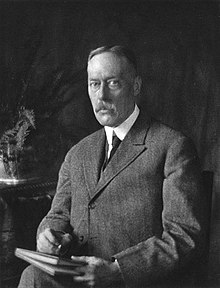Frank Johnson Goodnow
American historian (1859–1939)
Frank Johnson Goodnow, Ph.D., LL.B. (January 18, 1859 – November 15, 1939) was an American educator and legal scholar, born in Brooklyn, New York.

Quotes
edit- The state attains its ends as well through liberty as through government, as well through entrusting the care of matters of public interest to individuals as through the maintenance of public governmental services for their management.
- Frank J. Goodnow: Municipal Home Rule. New York: Columbia University Press; 1906, p. 37
- The use of the word "administration," is unfortunately somewhat misleading, for the word when accompanied by the definite article is also used to indicate... popularly the most important executive or administrative authorities.
- Frank Johnson Goodnow, cited in: Albert Lepawsky (1949), Administration, p. 44
Politics and Administration (1900)
editFrank Johnson Goodnow, Politics and Administration: A Study in Government, 1900; Transaction Publishers, 1914; 2009 edition with introduction by John A. Rohr.
- The conventional model for explaining the uniqueness of American democracy is its division between executive, legislative, and judicial functions. It was the great contribution of Frank J. Goodnow to codify a less obvious, but no less profound element: the distinction between politics and policies, principles and operations. He showed how the United States went beyond a nation based on government by gentlemen and then one based on the spoils system brought about by the Jacksonian revolt against the Eastern Establishment, into a government that separated political officials from civil administrators.
- Goodnow contends that the civil service reformers persuasively argued that the separation of administration from politics, far from destroying the democratic links with the people, actually served to enhance democracy. While John Rohr, in his outstanding new introduction carefully notes loopholes in the theoretical scaffold of Goodnow's argument, he is also careful to express his appreciation of the pragmatic ground for this new sense of government as needing a partnership of the elected and the appointed.
- Goodnow was profoundly influenced by European currents, especially the Hegelian. As a result, the work aims at a political philosophy meant to move considerably beyond the purely pragmatic needs of government. For it was the relationships, the need for national unity in a country that was devised to account for and accommodate pluralism and diversity, that attracted Goodnow's legal background and normative impulses alike. That issues of legitimacy and power distribution were never entirely resolved by Goodnow does not alter the fact that this is perhaps the most important work, along with that of James Bryce, to emerge from this formative period to connect processes of governance with systems of democracy.
- Abstract, 2009 edition:
- What parts of this function of administration should be subjected to the control of the function of politics?
- p. 22
Quotes about Frank Johnson Goodnow
edit- Another of Wilson's contemporaries who was greatly concerned about the mixing or "meddling" of politics with administration was Professor Frank J. Goodnow, who Inter became President of The Johns Hopkins University. Goodnow formalized his conception of administration in 1900 in his aptly entitled book, Politics and Administration. Goodnow's definition was similar to Wilson's, although he made the technical distinction, which Wilson had rejected, between politics as "the expression of the will of the state" and administration as "the execution of that will;" • but what was more important in Goodnow's concept of administration was the fact that he saw its wider implications in the long sweep of American history.
- Albert Lepawsky (1949), Administration, p. 44
- American students dismayed at the inadequacies of the ethical approach in the Gilded Age, stimulated by their pilgrimage to German universities, and led by such figures as J. W. Burgess, E. J. James, A. B. Hart, A. L. Lowell, and F. J. Goodnow have sought to recreate political science as a true science.
- Dwight Waldo. The Administrative State, 1948 p. 22-23
- When Woodrow Wilson wrote his essay "The Study of Administration" in 1887, he attempted to square the needs of a complex industrial nation with the demands of a democratic political culture (Felker 1993). With a vision of administration untouched by politics, he prescribed their separation. Frank Goodnow’s book Politics and Administration (1900) elaborated on this dichotomy, and Leonard White’s (1926) work made the separation of politics and administration an article of faith in the first textbook on the subject. This is emblematic of a turn public administration made at its inception, a decision paralleled by political science as it embraced the “god” of science and ignored the truth of context, history, values, and, messiest of all, unforeseen, unpredictable exigencies.
- Mary E. Guy, "Ties that bind: The link between public administration and political science." Journal of Politics 65.3 (2003): 641-655; p. 643.